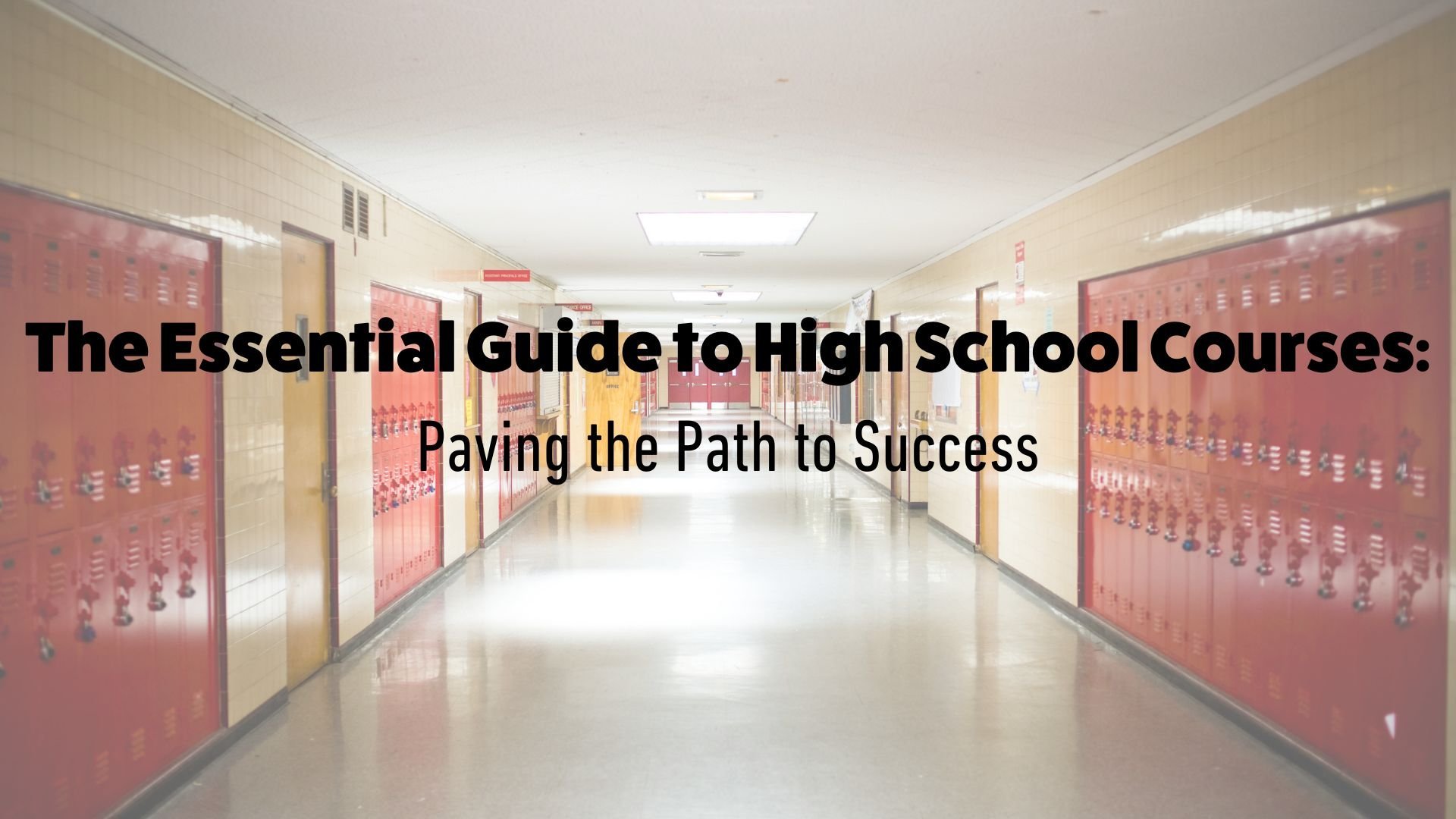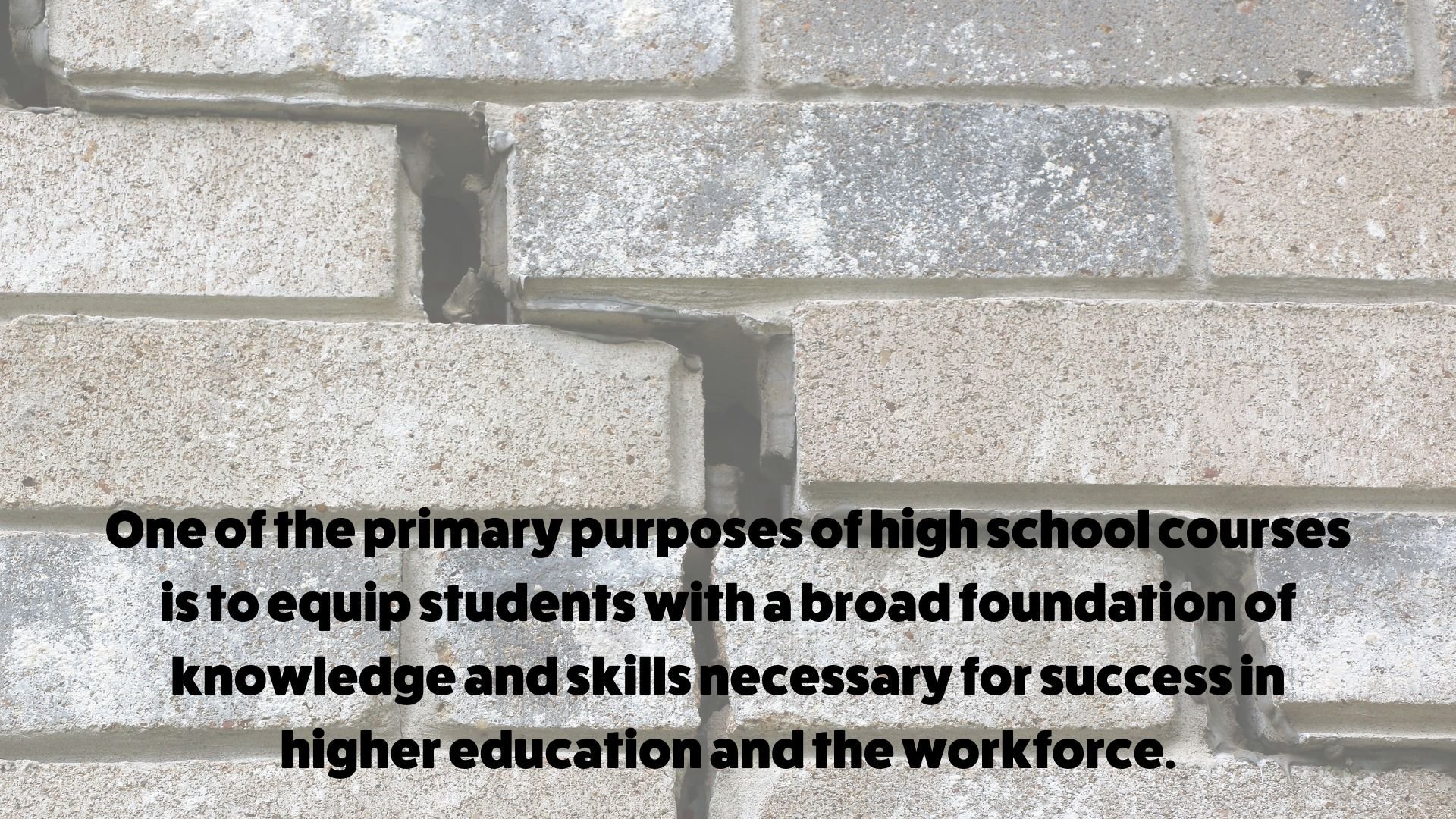The Essential Guide to High School Courses: Paving the Path to Success
High school is a critical phase in a student's educational journey, serving as a foundation for their future academic pursuits and career choices. One of the key factors that shape a student's high school experience is the selection of courses. With a plethora of options available, choosing the right combination of courses can be both exciting and overwhelming. In this comprehensive guide, we will explore the importance of high school courses, the core subjects, specialized electives, and strategies to create a well-rounded academic portfolio that aligns with your goals. So, let's dive in and discover how to make the most of your high school education!
High school courses play a pivotal role in shaping a student's academic trajectory and preparing them for future endeavors. They not only provide essential knowledge but also help develop critical skills such as critical thinking, problem-solving, and effective communication. Moreover, the courses you choose in high school can impact your college admissions prospects and influence your career options. By selecting a diverse range of courses, you can explore different disciplines, identify your passions, and make informed decisions about your educational and professional goals.
Interested in showcasing your intellectual vitality and initiative during high school? Find out how YOU can apply artificial intelligence to the subjects that interest you in InspiritAI’s AI Scholars Program. Students in the Inspirit AI Scholars program craft interdisciplinary AI projects engaging subjects of personal interest to them. Additionally, many students who have participated in the AI+X Individual Research Mentorship have gone on to win prestigious awards at various science fair competitions!
Throughout high school, you will encounter a variety of subjects, each offering unique opportunities for growth and exploration. Core subjects like English, mathematics, science, social studies, and foreign languages provide a strong foundation of knowledge and skills necessary for success in various academic and professional domains. Additionally, specialized electives allow you to delve deeper into areas of interest, expand your horizons, and potentially shape your future career path.
In the following sections, we will discuss the significance of core subjects, explore the wide array of specialized electives available, and provide strategies to create a well-rounded academic portfolio. Whether you aspire to pursue a career in STEM, the arts, humanities, or business, this guide will equip you with the knowledge and insights to navigate the world of high school courses and maximize your potential. So, let's embark on this journey together and unlock the doors to a successful future!
THE IMPORTANCE OF HIGH SCHOOL COURSES
High school courses play a pivotal role in shaping a student's academic trajectory and preparing them for future endeavors. They not only provide essential knowledge but also help develop critical skills such as critical thinking, problem-solving, and effective communication. Moreover, the courses you choose in high school can impact your college admissions prospects and influence your career options. By selecting a diverse range of courses, you can explore different disciplines, identify your passions, and make informed decisions about your educational and professional goals.
One of the primary purposes of high school courses is to equip students with a broad foundation of knowledge and skills necessary for success in higher education and the workforce. Core subjects like English, mathematics, science, social studies, and foreign languages are designed to provide a well-rounded education. English courses enhance reading comprehension, writing proficiency, and communication skills, which are essential in all areas of study and future professional endeavors.
Mathematics courses foster logical reasoning, problem-solving, and analytical thinking, enabling students to apply mathematical principles to real-world situations. Science courses, including biology, chemistry, and physics, cultivate scientific thinking, laboratory skills, and a deeper understanding of the natural world. Social studies courses explore history, geography, economics, and civics, promoting cultural awareness, critical thinking, and an understanding of societal structures.
Foreign language courses offer numerous cognitive and cultural benefits. Learning a second language enhances communication skills, broadens cultural perspectives, and creates opportunities for global engagement. These core subjects collectively provide students with a solid academic foundation, empowering them with the skills and knowledge necessary for success in higher education and beyond.
Furthermore, the courses you choose in high school can significantly impact your college admissions prospects. Admissions officers consider the rigor of your course load when evaluating your academic achievements. Selecting challenging courses and performing well in them demonstrates your commitment to academic excellence and your willingness to take on intellectual challenges. It also showcases your ability to handle the demands of college-level coursework.
Moreover, high school courses can influence your career options. They allow you to explore different disciplines and gain exposure to various fields of study. By choosing courses aligned with your career interests, you can acquire specialized knowledge, develop relevant skills, and make informed decisions about your future educational and professional pathways.
CORE SUBJECTS: BUILDING A STRONG FOUNDATION
Core subjects form the bedrock of a well-rounded education. While specific course offerings may vary from school to school, there are several essential subjects that are commonly found in high school curricula. These core subjects include:
1. English Language Arts
English courses focus on improving reading comprehension, writing skills, and analytical thinking. They enhance your ability to communicate effectively and provide a solid foundation for success in all areas of study. Through reading a diverse range of literature, analyzing texts, and honing your writing abilities, you develop critical thinking skills, creativity, and a deeper understanding of language and communication.
2. Mathematics
Mathematics courses develop logical reasoning and problem-solving abilities. They cover various topics such as algebra, geometry, calculus, and statistics, enabling you to apply mathematical principles to real-world scenarios. By studying mathematics, you enhance your analytical thinking, develop quantitative skills, and improve your ability to solve complex problems. These skills are essential not only in fields directly related to mathematics but also in numerous other disciplines such as science, engineering, economics, and computer science.
3. Science
Science courses encompass subjects like biology, chemistry, and physics. They foster scientific thinking, inquiry, and laboratory skills, enabling you to understand the natural world and engage with scientific concepts. Through hands-on experiments, data analysis, and critical observation, science courses cultivate curiosity, problem-solving abilities, and a deeper appreciation for the principles that govern our universe. They also lay the groundwork for pursuing scientific disciplines or related fields in college.
4. Social Studies
Social studies courses explore history, geography, economics, and civics. They promote cultural awareness, critical thinking, and a deeper understanding of societal structures and global issues. By studying social studies, you gain insights into the past, recognize patterns in human behavior, and develop the skills to analyze and interpret complex historical events. Additionally, social studies courses foster an understanding of diverse cultures, civic responsibility, and the skills necessary for informed citizenship.
5. Foreign Languages
Learning a foreign language provides numerous cognitive and cultural benefits. It enhances communication skills, broadens cultural perspectives, and creates opportunities for global engagement. By studying a foreign language, you not only develop proficiency in another language but also gain insights into different cultures, improve your overall communication skills, and increase your adaptability in an interconnected world. Foreign language courses also prepare you for potential language requirements in college and enhance your competitiveness in the job market.
These core subjects collectively provide a comprehensive educational foundation that prepares you for higher education, career opportunities, and lifelong learning. They equip you with critical skills such as critical thinking, effective communication, problem-solving, and cultural competence. Additionally, these subjects foster a holistic approach to learning by integrating knowledge from different disciplines and encouraging interdisciplinary connections.
It is important to approach core subjects with an open mind and a willingness to engage actively in the learning process. Take advantage of resources such as textbooks, online materials, and discussions with teachers to deepen your understanding and make meaningful connections across subjects. Embrace the challenges and opportunities these core subjects present, as they will provide a strong academic foundation and equip you with essential skills that extend beyond the classroom.
SPECIALIZED ELECTIVES: EXPLORING INTERESTS AND CAREER PATHWAYS
In addition to core subjects, high schools often offer a variety of specialized electives. These courses allow students to delve into specific areas of interest, explore potential career paths, and nurture their talents. Choosing specialized electives can be an exciting opportunity to personalize your education and shape your high school experience. Here are some popular elective categories worth considering:
1. STEM (Science, Technology, Engineering, and Mathematics)
STEM courses prepare students for careers in fields such as computer science, engineering, and healthcare. Examples include computer programming, robotics, biotechnology, and advanced mathematics. These courses emphasize hands-on problem-solving, critical thinking, and the application of scientific principles. By taking STEM electives, you can develop skills that are highly sought after in today's rapidly advancing technological landscape.
2. Fine Arts
Fine arts courses encompass disciplines like visual arts, music, dance, and theater. They encourage creativity, self-expression, and appreciation for the arts. Whether you have a passion for painting, playing a musical instrument, or performing on stage, fine arts electives provide opportunities for artistic growth and can ignite a lifelong love for creative pursuits. These courses enhance skills such as discipline, collaboration, and aesthetic understanding, nurturing both artistic abilities and personal expression.
3. Humanities
Humanities courses focus on literature, philosophy, and cultural studies. They foster critical thinking, interpretation, and analysis of human experiences. Courses in literature expose students to a wide range of literary works, allowing for the exploration of different writing styles, historical periods, and cultural perspectives. Philosophy courses encourage students to question assumptions, develop logical reasoning, and engage in ethical discussions. Cultural studies courses delve into the complexities of human societies, traditions, and social issues. Humanities electives deepen your understanding of the human condition and equip you with skills in analysis, empathy, and critical reflection.
4. Business and Entrepreneurship
These courses introduce students to the fundamentals of business, economics, and entrepreneurship. They provide insights into the world of commerce and equip students with essential skills for future professional endeavors. Business courses cover topics such as marketing, finance, management, and ethics, preparing students for careers in business or providing a solid foundation for further studies in the field. Entrepreneurship courses nurture innovation, problem-solving, and business planning skills, encouraging students to develop their own ventures or think creatively within established organizations.
5. Vocational Education
Vocational courses offer practical, hands-on training in specific trades and industries. Examples include automotive technology, culinary arts, cosmetology, woodworking, and healthcare professions. These courses provide students with valuable technical skills and industry certifications, preparing them for immediate employment after high school or serving as a foundation for further specialized training. Vocational education equips students with the knowledge and practical experience needed to succeed in a wide range of careers, from skilled trades to healthcare occupations.
When selecting specialized electives, consider your interests, talents, and future aspirations. Reflect on your hobbies, extracurricular activities, and potential career paths you are considering. Think about the skills and knowledge you would like to develop further. Speak with teachers, career counselors, and professionals in fields you are interested in to gain insights and guidance. Additionally, research colleges and universities to understand their admission requirements and recommended electives for specific majors or programs.
Remember that specialized electives provide an opportunity for self-exploration and personal growth. They allow you to pursue your passions, gain expertise in specific areas, and make informed decisions about your future educational and career pathways. By selecting electives aligned with your interests and goals, you can develop valuable skills, discover new passions, and gain a competitive edge in the college application process or the job market.
CREATING A WELL-ROUNDED ACADEMIC PORTFOLIO
Now that we understand the importance of both core subjects and specialized electives, let's discuss strategies for creating a well-rounded academic portfolio:
1. Identify your interests and goals
Reflect on your passions, strengths, and long-term aspirations. Consider the subjects and areas of study that genuinely excite you and align with your career ambitions. This self-awareness will guide your course selection process.
2. Balance your course load
Aim for a balance between core subjects and electives. While it's important to excel in the fundamental subjects, exploring elective courses can help you discover new interests, build unique skills, and demonstrate a diverse range of abilities to colleges and future employers.
3. Challenge yourself
Don't be afraid to take advanced or honors-level courses if you feel academically prepared. These courses provide a greater depth of knowledge and can challenge you to reach your full potential. They also demonstrate your willingness to take on rigorous academic challenges.
4. Seek guidance and advice
Consult with your school counselor, teachers, and mentors who can provide valuable insights and recommendations based on your interests and goals. They can help you navigate through the course catalog, understand prerequisites, and make informed decisions.
5. Consider college and career requirements
Research the admission requirements of colleges or universities you are interested in attending. Some institutions have specific course prerequisites or recommendations. Similarly, if you have a particular career path in mind, investigate whether certain high school courses or certifications are advantageous for that field.
6. Explore extracurricular activities
High school is not just about academics; it's also a time for personal growth and development. Engaging in extracurricular activities such as clubs, sports, community service, or internships can complement your academic coursework and demonstrate your interests, leadership skills, and commitment.
By following these strategies, you can create a well-rounded academic portfolio that showcases your strengths, interests, and dedication. This portfolio will not only enhance your college applications but also prepare you for future academic and career success.
Remember that the goal of a well-rounded academic portfolio is not merely to accumulate a checklist of courses and activities. It is about demonstrating a genuine passion for learning, a willingness to explore diverse subjects, and a commitment to personal growth. Admissions officers and employers value individuals who are intellectually curious, adaptable, and capable of handling challenges from multiple perspectives.
Furthermore, a well-rounded academic portfolio can help you discover your true passions and refine your career goals. Exploring a range of subjects and electives exposes you to different fields of study and potential career pathways. It allows you to discover your strengths and interests, guiding you towards a fulfilling and meaningful future.
Conclusion
High school courses are not merely a set of academic requirements; they are the building blocks of your educational and professional future. By carefully selecting a combination of core subjects and specialized electives, you can create a well-rounded academic portfolio that showcases your strengths, passions, and potential. These courses provide essential knowledge, develop critical skills, and shape your academic trajectory. They open doors to college admissions, career opportunities, and personal growth.
Embrace the opportunities presented by high school courses. Explore diverse subjects, challenge yourself academically, and pursue your interests with enthusiasm. Use your course selection as a tool to discover your passions, cultivate your talents, and shape your future. Remember that high school is a transformative time, and the courses you choose can have a profound impact on your educational and professional journey.
So, take advantage of the resources available, seek guidance, and make informed decisions. Build a well-rounded academic portfolio that reflects your unique strengths and aspirations. With the right combination of courses, you can lay the foundation for a successful and fulfilling future.
About Inspirit AI
AI Scholars Live Online is a 10 session (25-hour) program that exposes high school students to fundamental AI concepts and guides them to build a socially impactful project. Taught by our team of graduate students from Stanford, MIT, and more, students receive a personalized learning experience in small groups with a student-teacher ratio of 5:1.




